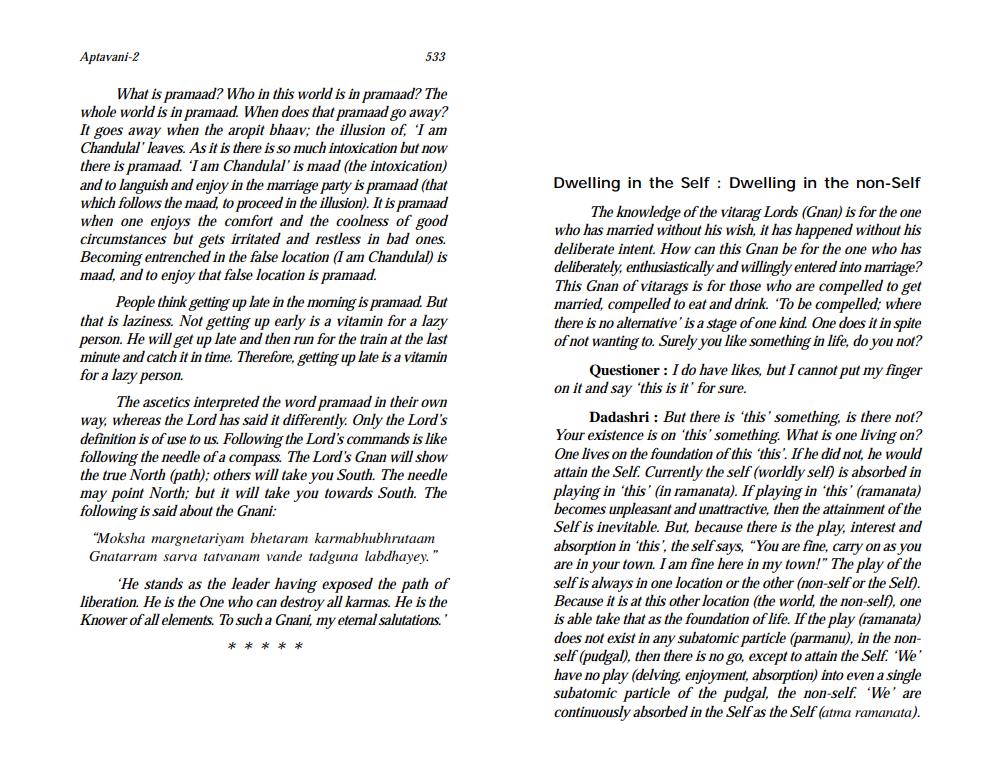________________
Aptavani-2
533
What is pramaad? Who in this world is in pramaad? The whole world is in pramaad. When does that pramaad go away? It goes away when the aropit bhaav; the illusion of, I am Chandulal' leaves. As it is there is so much intoxication but now there is pramaad. 'I am Chandulal' is maad (the intoxication) and to languish and enjoy in the marriage party is pramaad (that which follows the maad, to proceed in the illusion). It is pramaad when one enjoys the comfort and the coolness of good circumstances but gets irritated and restless in bad ones. Becoming entrenched in the false location (I am Chandulal) is maad, and to enjoy that false location is pramaad.
People think getting up late in the morning is pramaad. But that is laziness. Not getting up early is a vitamin for a lazy person. He will get up late and then run for the train at the last minute and catch it in time. Therefore, getting up late is a vitamin for a lazy person.
The ascetics interpreted the word pramaad in their own way, whereas the Lord has said it differently. Only the Lord's definition is of use to us. Following the Lord's commands is like following the needle of a compass. The Lord's Gnan will show the true North (path); others will take you South. The needle may point North; but it will take you towards South. The following is said about the Gnani:
"Moksha margnetariyam bhetaram karmabhubhrutaam Gnatarram sarva tatvanam vande tadguna labdhayey."
'He stands as the leader having exposed the path of liberation. He is the One who can destroy all karmas. He is the Knower of all elements. To such a Gnani, my eternal salutations."
Dwelling in the Self
Dwelling in the non-Self
The knowledge of the vitarag Lords (Gnan) is for the one who has married without his wish, it has happened without his deliberate intent. How can this Gnan be for the one who has deliberately, enthusiastically and willingly entered into marriage? This Gnan of vitarags is for those who are compelled to get married, compelled to eat and drink. 'To be compelled; where there is no alternative' is a stage of one kind. One does it in spite of not wanting to. Surely you like something in life, do you not?
Questioner: I do have likes, but I cannot put my finger on it and say 'this is it' for sure.
Dadashri: But there is 'this' something, is there not? Your existence is on 'this' something. What is one living on? One lives on the foundation of this 'this'. If he did not, he would attain the Self. Currently the self (worldly self) is absorbed in playing in 'this' (in ramanata). If playing in 'this' (ramanata) becomes unpleasant and unattractive, then the attainment of the Self is inevitable. But, because there is the play, interest and absorption in 'this', the self says, "You are fine, carry on as you are in your town. I am fine here in my town!" The play of the self is always in one location or the other (non-self or the Self). Because it is at this other location (the world, the non-self), one is able take that as the foundation of life. If the play (ramanata) does not exist in any subatomic particle (parmanu), in the nonself (pudgal), then there is no go, except to attain the Self. 'We' have no play (delving, enjoyment, absorption) into even a single subatomic particle of the pudgal, the non-self. 'We' are continuously absorbed in the Self as the Self (atma ramanata).




